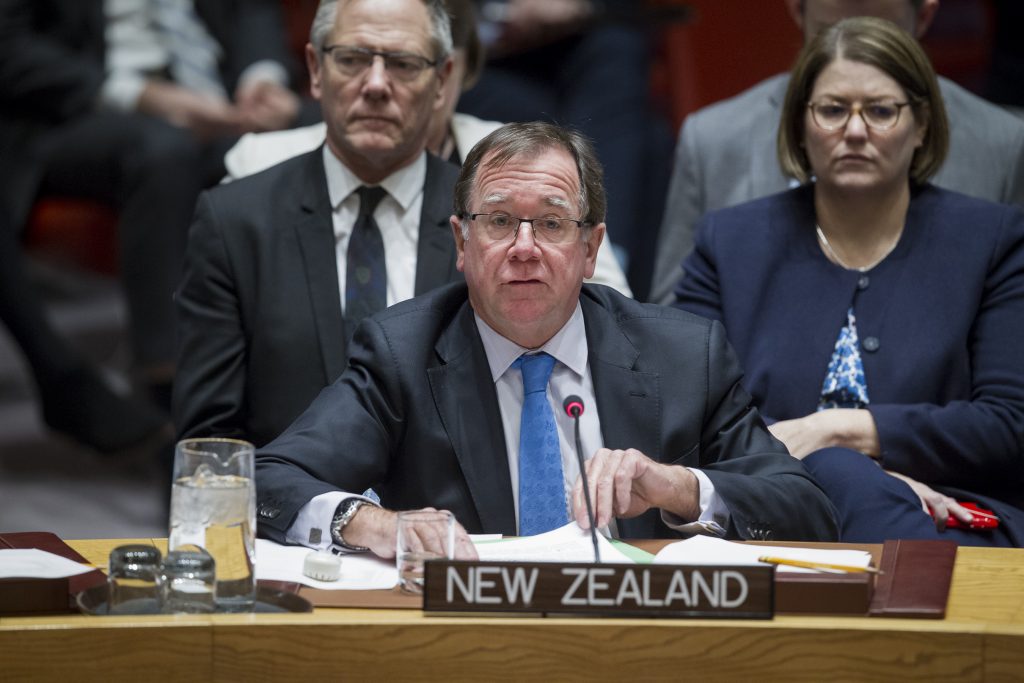Australia/Israel Review
AIR New Zealand: Wellington’s UN votes cause concern
Dec 28, 2018 | Miriam Bell

The double standards of the United Nations when it comes to Israel appear to be glaringly obvious.
According to the organisation UN Watch, there have been 21 resolutions condemning Israel adopted by the UN’s General Assembly this year, and just six in total condemning other countries. In a similar vein, the Israel Institute of NZ says there have been more than 500 UN resolutions criticising Israel in recent years – but not one condemning Hamas.
However, knowledge of this situation is not widespread in New Zealand. Outside the Jewish community, most people are not aware of the UN’s blinkered approach to anything relating to Israel.
In fact, most New Zealanders know little, and probably care less, about the UN. Mainstream media coverage of goings on at the UN tends to centre on events like Prime Minister Jacinda Ardern taking her baby, Neve, to the UN earlier this year or former PM Helen Clark’s bid for the Secretary-General role.
Sadly, this lack of knowledge, or awareness, appears to extend to the people – be they diplomats or politicians – charged with representing New Zealand at the UN.
New Zealand’s UN voting record on Israel has been highly problematic in recent years. Over the course of his term, former foreign minister Murray McCully consistently refused to condemn Palestinian terrorism. This attitude culminated in his co-sponsorship, on behalf of New Zealand, of UN Security Council Resolution (UNSC) 2334 in late 2016, which one-sidedly condemned Israel in the strongest terms over settlements, made no demands of the Palestinians, and used language that appeared to undo UNSC Resolution 242, the basis for peace negotiations over the last 50 years.
At the time, then PM Bill English defended Resolution 2334. Subsequently, many of McCully’s National Party colleagues have said they believe that co-sponsoring 2334 was wrong, and have also argued that McCully did not follow correct cabinet protocols in doing so.
In some ways, New Zealand’s record of UN voting on Israel has become worse under the Ardern Government.
In November, the UN General Assembly’s Fourth Committee (Special Political and Decolonisation Committee) adopted nine resolutions specifically against Israel. New Zealand voted for eight and abstained on one. Not long afterwards, New Zealand announced it would be increasing its aid to the UN Relief and Works Agency (UNRWA) which serves only Palestinian refugees – despite strong evidence of corruption and turning a blind eye to terrorism at UNRWA, as well as its ongoing tacit support for the deal-breaking “Palestinian right of return” to Israel.
Then in December, New Zealand voted in favour of the US-sponsored General Assembly resolution condemning Hamas, but abstained on an Arab League-sponsored resolution requiring the Hamas vote to have a two-thirds majority to pass. This meant the resolution did not pass despite getting a solid majority. New Zealand was one of just three Western democracies to abstain on the Arab League motion – which only passed by a single vote – and earned specific censure from UN Watch for doing so.
All of this has only added to growing concerns in the Jewish community about the Government’s attitude to, and policies on, Israel.
Zionist Federation of New Zealand President Rob Berg said New Zealand’s recent voting on a number of anti-Israel resolutions seems to be a continuation of McCully’s unilateral decision to co-sponsor UNSC Resolution 2334. “The difference now is that this seems to be government policy rather than the agenda of a lone individual.”
He finds New Zealand’s voting in regard to the resolution condemning Hamas particularly troubling. That’s in no small part because anti-Israel resolutions are not required to pass the same high two-thirds majority threshold.
“Although New Zealand voted in favour of the resolution condemning Hamas, its part in the passage of the required 2/3 majority for the resolution to pass means New Zealand in effect giving the green light to more Hamas terrorism against Israel and the Jewish people… it is inconceivable that New Zealand would vote out of step with others in the Western World who are trying to fight Islamist terrorism.”
Israel Institute of NZ director David Cumin agrees. He says it raises serious questions about who was responsible for the decision to abstain on the motion forcing a two-thirds majority vote on the resolution condemning Hamas. He’d also like to know why New Zealand has not demanded the same high threshold for any of the hundreds of resolutions against Israel over the years.
“While New Zealand voted for the condemnation of terror, the abstention on the obvious political ploy to thwart that condemnation is concerning. Perhaps one day New Zealand will truly take a role in calling Hamas to account and send a small, but important, message to proponents of terror around the world. Unfortunately, we are yet to see such principled actions from Aotearoa on the world stage.”
Cumin says be believes a shift in New Zealand’s current attitude is possible, pointing to Australia as an example of a country which has changed its voting pattern recently. “But it will take strong leadership and a willingness to acknowledge the inherent anti-Israel bias at the UN.”
Tags: Israel, New Zealand, United Nations






